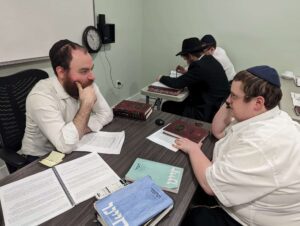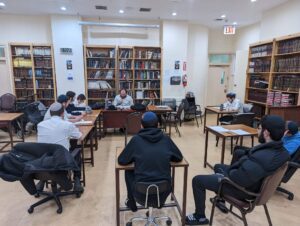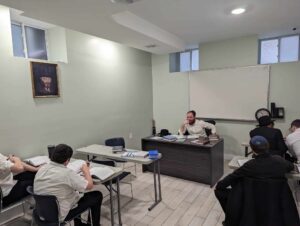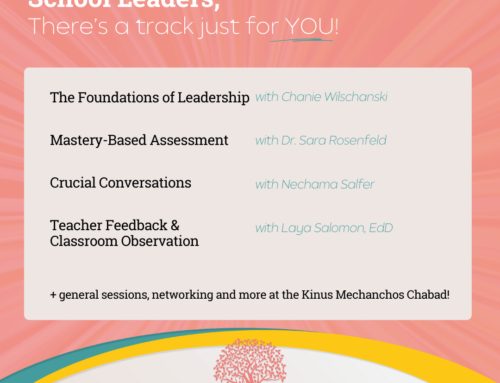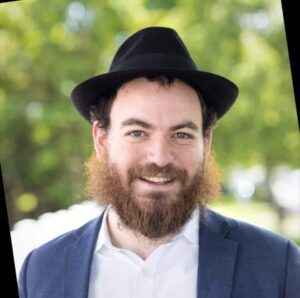 “Meet the Chinuch Shluchim” is jointly presented by the Menachem Education Foundation (MEF) and COLlive.com Community News Service. The series features Chabad teachers from different states, countries, and demographics speaking about their life and Chinuch Shlichus.
“Meet the Chinuch Shluchim” is jointly presented by the Menachem Education Foundation (MEF) and COLlive.com Community News Service. The series features Chabad teachers from different states, countries, and demographics speaking about their life and Chinuch Shlichus.
This Week: Rabbi Yehuda Fenton, a Mechanech at Darchei Menachem and a Mashpia at Chovevei Torah, both in Crown Heights, shares a story about the teacher who transformed his learning and how discovering Chassidus inspired a life change.
What kind of student were you as a child?
I was raised in Lexington, Massachusetts, and was a pretty terrible student. I was constantly distracted and often missed major benchmarks in my learning. At a young age, I missed a few key benchmarks that would have given me the basic skills for learning and it took me a long time to catch up.
I started learning Gemara in 5th grade but I couldn’t yet navigate a basic Mishna. I somehow flew under the radar and when I got to Zal, I still couldn’t read Gemara. In 10th grade, I was in a Litvish Yeshiva, and the teacher noticed I was struggling. He pulled me aside and said, “let me help you with this.” He helped me gain those critical skills I needed and suddenly I was able to read. It was an incredibly powerful experience and this simple solution ultimately changed my life. I had in my head that Gemara was not for me, and went from not liking Gemara to becoming a much more successful and confident student.
How did you go from a Litvish Yeshiva experience to a Chabad one?
As a Yeshiva student, I had a lot of philosophical questions and I did not feel like I was getting satisfactory answers. Someone left a Kuntres Umaayon on the bookshelves in the Zal and I started reading it. From the first page, it was asking the questions I had been asking for years and Chassidus then provided clear answers. I needed to learn more. Although I grew up going to a Chabad House, and the shliach, Rabbi Alti Bukiet, strongly encouraged me to transfer to a Lubavitch Yeshiva, I hadn’t seriously considered it until finding the sefer. Since discovering what Chassidus was all about I decided to transfer to a Chabad Yeshiva to learn more and thought I would see where it went. I immediately loved it and was motivated to work really hard and catch up on my learning. The rest is history.
Why did you decide to pursue a career in Chinuch?
Since I was a young child, I have always loved sharing ideas with others and the concept of teaching and connecting with others in that way always appealed to me. When I first set out to find a job, I was debating between classic Shlichus and Chinuch. When I was a Bochur I went on Shlichus to a Yeshiva in Los Angeles and got a real sense of this job’s importance. I began to view Chinuch as a vital part of Shlichus and saw how great the need was for quality teachers in our schools. I believe that those who are able to commit to this unique Shlichus should absolutely go into teaching.
Can you describe your average day?
My regular workday is about 13 hours long. I begin teaching my first class at 8:00 am and I teach straight through until 3:30 pm. I then have a 3-hour break to go home and see my wife and three children. At 6:30 pm I begin teaching again and I officially finish at 9:00 pm, but there are often Farbrengens at night. I can get home anywhere from 9:30 pm – 3:00 am.
With such a long workday, how do you juggle work and home responsibilities?
I strive really hard to create some separation between my job and my home. I used to work at Lamplighters Yeshiva where I ran the Mesivta for three years. That job was extremely consuming and I was on the job and on-call nearly 24/7. Even when I was home, I was not mentally there as I was busy thinking about and problem-solving issues at the Mesivta. It wasn’t a sustainable role. Ever since I switched to my current job, I am now very committed to being present and available when I am home.
What do you do in your free time?
As hobbies, I enjoy cooking and writing. But my favorite thing to do with my very little time off is to simply learn Torah. I enjoy the process of learning not for the purpose of teaching or preparing a class but just for the sake of learning. It feels like a real treat to just learn by myself with the pure enjoyment of learning.
What is your favorite part of teaching?
I love teaching. It really is the most fantastic job. The experience of being a part of the boys’ learning, watching them open their eyes to new ideas, inspiring them, and helping them change their perspective on Torah and life is an absolute privilege. It is a beautiful thing to get to do. As teachers, we have the opportunity to connect with individual students and help them grow. It is not just about teaching a particular class, but the ability to guide them in really significant ways and see that reflected in their behavior and life choices.
What is the most difficult part of teaching?
The hardest part of teaching is when you are up against some kind of obstacle that is very difficult to help the student overcome. Sometimes you can invest hours and so many resources to help a student to no avail. With my years of experience, I have gotten better at assessing when something is going to be very challenging. When something is beyond my sphere of influence it can be very hard to come to terms that there is nothing I can do to help the child. That’s when I try to connect them with other resources and daven that they receive the tools they need to overcome.
How would you describe your teaching style?
I try to bring creativity and originality to my teaching. I was very inspired by my time at Lamplighters. The staff there are still some of the best teachers I ever met. The amount I learned there from those educators on a daily basis was astounding. Sometimes in Chinuch, you can find teachers who may be burnt out or don’t really want to be there. At Lamplighters, every single teacher there not only wanted to be there but absolutely loved what they were doing. It was so special to sit down with a first-grade teacher who lived and breathed his job. They weren’t checking out after 9-5.
I try to bring that dedication and drive to my teaching. I try to be very open and innovative in my teaching. Both of the Yeshivas I teach at today are very open to innovation and allow me to bring creativity in the classroom. I am constantly trying different ways to engage and connect with the Talmidim. When we learned about Hilchos Shabbos, for example, the students learned about the Halachos of cooking on Shabbos and then learned about ovens all over the world and different cooking methods. They then tried to apply those Halachos to the interesting cooking techniques of various countries that may still be in use today.
What is something your students may be surprised to learn about you?
I am not sure there is something that they would be surprised to learn about me since I am very open with my students. I share with them that I often feel as insecure as they do about my own growth. I believe in connecting through honesty and openness.
What would you tell someone who is considering making Chinuch their Shlichus?
It is the most essential Shlichus available today. So often the best minds of our community are going out to other places. Sometimes someone will teach for a few years while they search for a Makom Shlichus. But our community is desperate for Mechanchim who are there for the long haul. Our best resource is Mechanechim who have taught generations. All our Moisdos desperately need these pillars who can influence the world through their teaching. Chinuch is in every way as challenging and as meaningful as any other Shlichus.
Can you share a teaching tip with readers?
Students need to enjoy being in class before anything else. If our students don’t walk out of our Yeshivas loving Torah and Yiddeshkeit, nothing else matters. Teaching is not about hitting a quota of material. It is about conveying the love of Yiddishkeit. That is why Farbrenging and telling stories are as much a part of Chinuch as any in the Sefer learning.
How do you picture the future of Chabad Chinuch, and how can we best prepare for it?
We are moving towards listening to the children more and pushing ourselves to find ways to speak their language. Mechanchim feel more comfortable connecting with our students on a personal level. We are moving towards a place where we are more open to having whatever conversation is needed to help them be successful. That may be making alternative Yeshivas or accepting different students’ experiences. All of this is happening more and more and G-d willing it will continue to increase. I hope we will get better at perfecting these methods which will allow us to be more successful.
